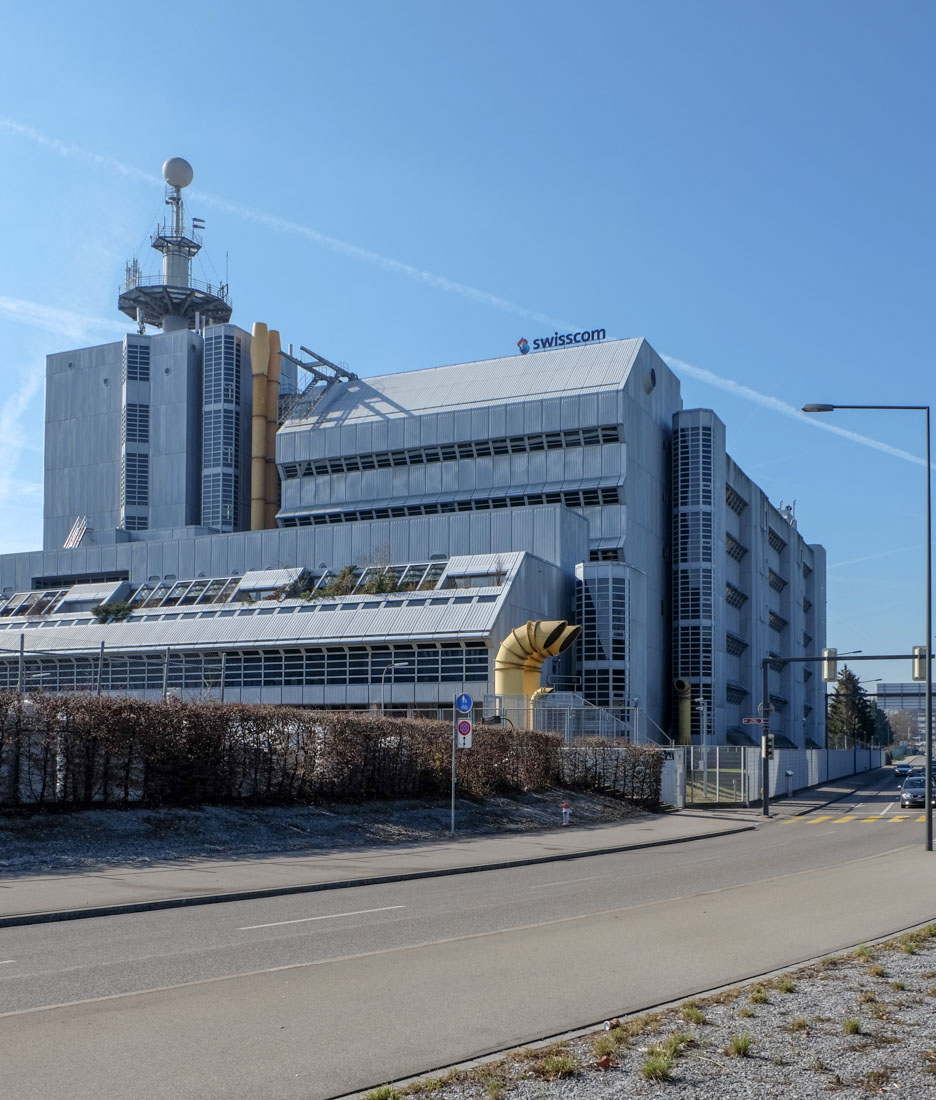 |
 |
 |
 |

Herdern Communications Center
Aargauerstrasse 10, Zürich
1972 - 1978
In the 1970s and 1980s, Theo Hotz
gained international fame through two major engineering buildings- the
Herdern communications center and the Mülligen mail-order center. Like
a shiny machine, the communications center is located at the A1 highway
and marks the entrance to the city. From the nearby railway line, the
futuristic-looking building is just as recognizable. The metallic gray
facade contrasts with strikingly colored elements. The technical
components and the sculptural volumetry are combined in a successful
way. The building is organized according to the functions, so that an
office wing, the transmission tower and the telephone exchange can be
clearly read. A noteworthy element are the window bands on the main
building. These are inclined downwards in order to reduce the solar
radiation, especially since the building already generates great heat
through the telephone relays. The building was extensively renovated
between 2010 and 2015 and optimized for future use. Today, the building
is used as the data center for the Swisscom company.
In den 1970er und 1980er Jahren erlangte Theo Hotz internationale Bekanntheit durch seine beiden von der Technik geprägten Grossbauten - das Fernmeldebetriebszentrum Herdern und das Briefverteilzentrum Mülligen. Wie eine glänzende Maschine befindet sich das Fernmeldebetriebszentrum an der Autohbahn A1 und markiert die Stadteinfahrt. Von der naheliegenden Bahnlinie ist das futuristisch wirkende Gebäude ebensogut erkennbar. Die metallen graue Fassade kontrastiert mit auffallend farbigen Elementen. Die technischen Komponenten und die skulpturale Volumetrie werden auf gelungene Weise kombiniert. Das Gebäude ist entsprechend der Funktionen gegliedert, so dass sich ein Bürotrakt, der Sendeturm und die Telefonzentrale klar ablesen lassen. Ein bemerkenswertes Element sind die Fensterbänder am Hauptbaukörper. Diese sind nach unten geneigt, um die Sonneneinstrahlung zu reduzieren, zumal im Gebäude bereits grosse Wärmeentwicklung durch die Telefonrelais entsteht. Das Gebäude wurde in den Jahren 2010 bis 2015 umfassend saniert und für die zukünftige Nutzung optimiert. Heute wird das Gebäude als Rechenzentrum der Swisscom genutzt.
In den 1970er und 1980er Jahren erlangte Theo Hotz internationale Bekanntheit durch seine beiden von der Technik geprägten Grossbauten - das Fernmeldebetriebszentrum Herdern und das Briefverteilzentrum Mülligen. Wie eine glänzende Maschine befindet sich das Fernmeldebetriebszentrum an der Autohbahn A1 und markiert die Stadteinfahrt. Von der naheliegenden Bahnlinie ist das futuristisch wirkende Gebäude ebensogut erkennbar. Die metallen graue Fassade kontrastiert mit auffallend farbigen Elementen. Die technischen Komponenten und die skulpturale Volumetrie werden auf gelungene Weise kombiniert. Das Gebäude ist entsprechend der Funktionen gegliedert, so dass sich ein Bürotrakt, der Sendeturm und die Telefonzentrale klar ablesen lassen. Ein bemerkenswertes Element sind die Fensterbänder am Hauptbaukörper. Diese sind nach unten geneigt, um die Sonneneinstrahlung zu reduzieren, zumal im Gebäude bereits grosse Wärmeentwicklung durch die Telefonrelais entsteht. Das Gebäude wurde in den Jahren 2010 bis 2015 umfassend saniert und für die zukünftige Nutzung optimiert. Heute wird das Gebäude als Rechenzentrum der Swisscom genutzt.
